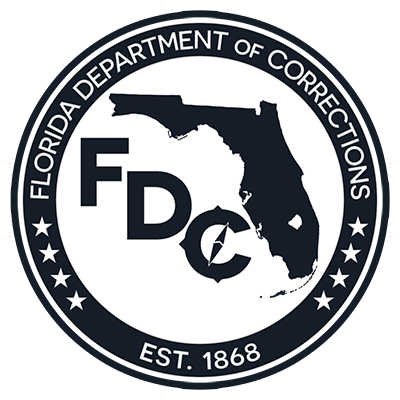Bureau of Education
The Bureau of Education provides meaningful opportunities to incarcerated individuals, helping them better themselves and equipping them with competencies conducive to successful social reintegration. Offerings include, academic education, career and technical education (CTE), library services, transition programs, and services specific to special needs and youthful offender populations. The Bureau of Education also coordinates teacher certification for the Department’s correctional educators.
Academic Education
Academic education is the provision of traditional coursework (e.g. math, English, reading, science, social studies, etc.) to general and special populations through various programs. Students in academic education may work toward earning their high school diploma or equivalency, or may complete coursework for self-betterment. Academic education programs include adult basic education (ABE), mandatory literacy, GED® preparation, close management education, education for young adults and youthful offenders (Title I), special education services, voluntary literacy, and local education agency (LEA) programs.
Media Coverage of FDC Academic Education
 WUFT
WUFT Miami Herald
Miami HeraldCareer & Technical Education
Best Practices in Work Force Development at FDC
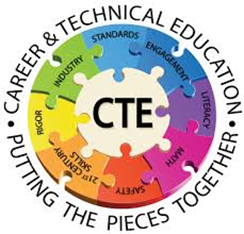
The Florida Department of Corrections provides 92 career and technical education (CTE) courses in 37 distinct vocational trades spanning 11 career clusters aligned to Florida’s in-demand occupations. Expansion of programs has been realized through contracted education partners that include state colleges, technical colleges, and community providers. Technical training, employability skill development and industry recognized credentialing are integrated into the CTE programs and ensure returning citizens are job-ready upon release. Carl D. Perkins Grant and Inmate Welfare Trust funds supplement CTE programming needs.
Media Coverage of FDC Career and Technical Education
WUFT Lancaster C.I.’s Marine Program Coverage
Coverage begin at 4:00
Community Transition Services
Best Practices in Work Force Development at FDC
Recruiting Second Change Employers
The Community Transition team partners with industry, reentry service providers, education providers, trade and professional associations, and workforce development providers to facilitate reentry services and employment for returning citizens and those under supervision in the community. Such partnerships are significantly important to the successful reintegration of justice-involved individuals back into society.
Industry engagement is a particular focus because research shows that the number one predictor of whether someone with a previous criminal conviction will reoffend is poverty. The effects that employment has on the reduction of recidivism are significant. A study by the United States Sentencing commission showed that if returning citizens can find work within one year of release, their recidivism rates are reduced by 40%. Nationally, recidivism rates range from 31 to 70%, while the recidivism rate for those placed in jobs shortly after their release range from 3.3-8%. For high-risk offenders who had a recidivism rate of 40.7%, those placed in jobs soon after release had a recidivism rate of 5%.
Florida Department of Corrections research shows that male inmates with employment set up when they leave prison have a 14% lower recidivism rate (page 11-12 of 25 in the pdf); and those in work release programs while in the Florida Department of Corrections system recidivate at a 13% rate compared the Florida’s overall 24% recidivism rate. Simply put, if individuals cannot survive making an honest living due to being denied opportunity, they will turn to illegal means.
Legal employment provides beneficial structure to one’s day, and access to peers who are positive influences. As a result, as a priority initiative, the Community Transition team is currently partnered with over 75 Second-Chance employer partners statewide, to connect returning citizens and offenders to employment pre-release. This initiative is known as the “Pre-Release Hiring Events” and since its inception during March of 2021, it has been successful in connecting over 800 formerly and currently incarcerated individuals to employment prior to their release. For the current calendar year (2022) the team has been given a strategic goal to connect 5% of the releasing population to employment pre-release.
Additionally, this department, which is housed within the Bureau of Education’s Workforce Development division, manages a statutorily mandated 100-Hour Employability/Life Skills program, currently known as “Compass 100”, which prepares inmates within their last 18 months of incarceration for successful employment and employment retention, to enable them to become productive and thriving members of the communities to which they will be returning. This program introduces its students to concepts such as career exploration, tools for job searching, job application and resume creation, job leads, interviewing, negotiating job offers, success on a new job, personal finance management, personal development (goal setting, life skills, etc.), and identifying community resources.
Moreover, the Community Transition team is utilizing technology, such as DTEN Zoom monitors, to connect returning citizens with employers and community providers of services for job interviews and service referrals and engagements, pre-release. Among the planned uses of this technology moving forward are workshop facilitation to inmates on such topics as explaining federal bonding to an employer, explaining a criminal background to an employer, mock interviews, development of an electronic portfolio, identification of housing and community resources such as SNAP and TANF, and navigating the Employ Florida Marketplace, the State’s workforce system.
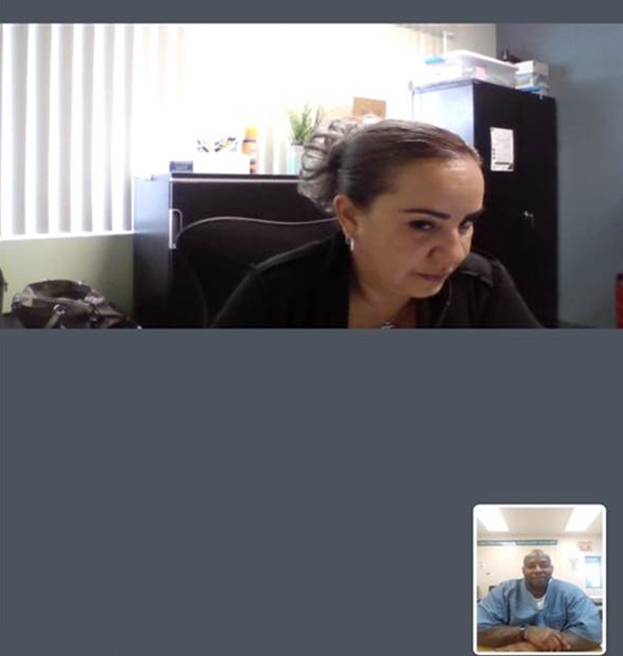
Pre-Release Hiring Events have occurred at the following facilities to date:
Tallahassee Community Release Center
Gadsden Re-Entry Center
Santa Rosa Correctional Institution
Jefferson Correctional Institution
Okaloosa Workcamp
Apalachee Correctional Institution
Martin Correctional Institution
Sago Palm Re-Entry Center
Turning Point Community Release Center
Polk Correctional Institution
Hamilton Correctional Institution
Circuit 9 Probation & Parole
Lancaster Correctional Institution
Baker Correctional Institution (pre-close)
Columbia Correctional Institution
Tomoka Correctional Institution
Franklin Correctional Institution
Apalachee Correctional Institution West
Cross City Correctional Institution
Lawtey Correctional Institution
Central Florida Reception Center East
Florida Women’s Reception Center
Charlotte Correctional Institution
Everglades Correctional Institution
Kissimmee Community Release Center
Re-Entry Alliance of Pensacola
Northwest Florida Reception Center
Reentry Alliance Pensacola
Holmes Correctional Institution
Gulf Correctional Institution
Jackson Correctional Institution
Everglades Re-Entry Center
South Florida Reception Center
Okeechobee Correctional Institution
Opa Locka Work Release Center
Hamilton Correctional Institution Annex
Sumter Correctional Institution
Mayo Correctional Institution
Baker Re-Entry Center
Suwannee Correctional Institution
Taylor Correctional Institution
Madison Correctional Institution
Apalachee Correctional Institution East
Sumter Work Camp
Mayo Correctional Institution
Lake Correctional Institution
Homestead Correctional Institution
South Florida Reception Center Main
Martin Work Camp
St. Petersburg Community Release Center
Finally, the Community Transition team utilizes a multi-disciplinary approach to release planning using a data-informed structure to conduct release planning that includes multiple disciplines within Florida’s correctional institutions, focused on transition planning. This initiative is known as the “Multi-Disciplinary Transition Team”.
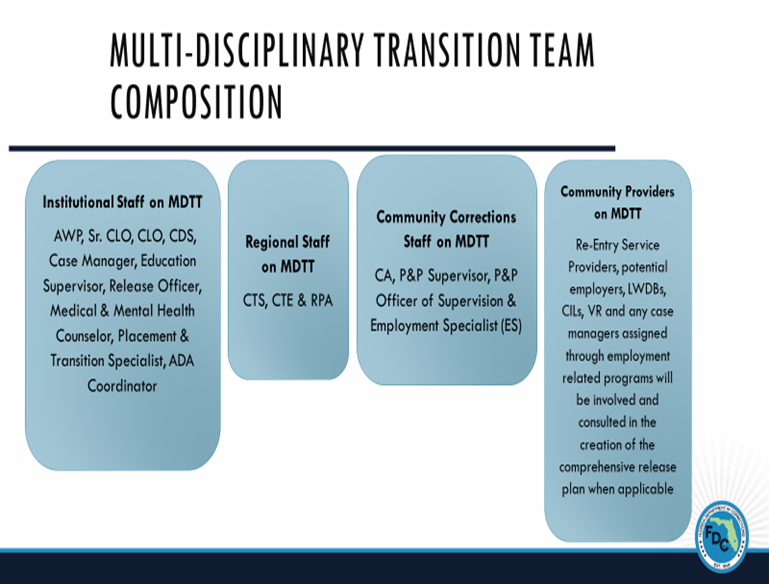
Canine Obedience Training
Through collaborative partnerships between the Florida Department of Corrections and various animal service organizations, the Department operates numerous Canine Obedience Training Programs throughout the State. These programs are intended to increase the adoptability of the canines and provide inmates with job skills beneficial upon release. During the training period, dogs receive socialization and are taught basic obedience commands such as sit, stay, come and to walk by your side without pulling on the leash. Participating inmates can earn up to four credentials by successfully demonstrating competencies learned in the program.
These programs vary between eight weeks to up to 18 months. To locate the program closest to you, click the county listing and contact the service provider for information about dogs available for adoption.
Higher Education in Prison (HEP) Programs
As part of the United States Department of Education’s Second Chance Experimental Site Initiative which offers Pell grant funds to incarcerated individuals, the Florida Department of Corrections is committed to working with three (3) of Florida’s renowned colleges and universities, Florida Gateway College, Miami-Dade College, and Palm Beach State College, as well as Ashland University out of Ashland, Ohio, to offer accredited, credit-bearing Associate’s and Bachelor’s degrees in six (6) institutions throughout the state. Through a variety of instructional platforms to include face-to-face, virtual, and online learning platforms, the Department is expanding high-quality educational opportunities to individuals in its custody and care. Research shows that postsecondary education can reduce recidivism and increase employability and earnings for returning citizens. For more information about these programs and eligibility requirements, please click here.
Library Services
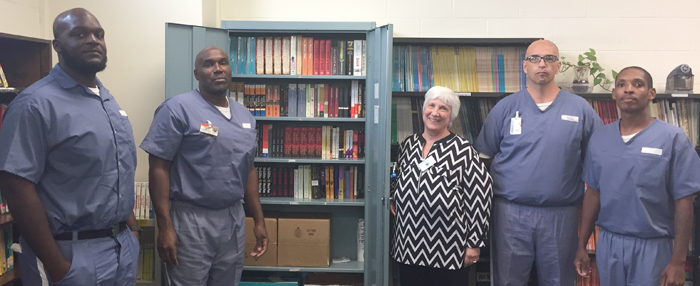
The FDC offers general library and law library services at all major institutions. General Library services include many of the same services found in public libraries. Law Library Services facilitate legally mandated inmate access to courts in accordance with important state and federal case law, as well as Florida statutes.
- Bureau of Program Development
- CINAS and CINAS Lite
- Criminogenic Domains
- ORION
- ORION ES
- Program Clearinghouse
- Program Review Application
- Bureau of Education
- Academic Education
- Career & Technical Education
- Community Transition Services
- Canine Obedience Training
- Higher Education in Prison (HEP)
- Library Services
- Bureau of Substance Use Treatment
- Substance Use
- Community Based Programs
- Community Based Re-Entry Programs
- Re-Entry Centers
- Volunteer Services
- Resource Directory
- Re-Entry Programs Registration Application
- Bureau of Chaplaincy Services
- Worship/Religious Education Programs and Services
- Religious Diet Program
- Faith and Character Based Programs

